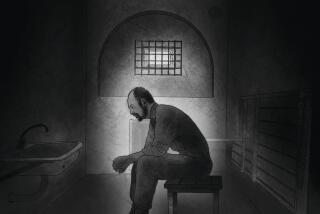Rights panel issues early report on Russian lawyer’s prison death
Reporting from Moscow — He was chained to a cot, a lone prisoner in a small cell facing eight guards who beat him while a summoned ambulance crew was kept waiting outside. When the doctors were finally admitted to the prison, they found Moscow lawyer Sergei Magnitsky dead, his body bruised, most of his knuckles smashed, one of his arms dark blue from a grip of the handcuffs lying nearby.
The attorney’s death in Moscow’s infamous Sailor’s Silence prison was described Tuesday in a report delivered to Russian President Dmitry Medvedev by his advisory human rights council. The panel called for an investigation of possible corruption on the part of officials involved in the nearly yearlong imprisonment of Magnitsky on tax evasion charges.
Medvedev, who had ordered the official investigation shortly after the Nov. 16, 2009, death of Magnitsky, met with members of the council in the southern city of Nalchik.
“The Sailor’s Silence prison duty doctor, Alexandra Gauss, who examined Magnitsky that night, decided that he had had a nervous breakdown and summoned eight guards to calm him down before calling an ambulance, whose doctors were not allowed inside the prison for an hour,” Valery Borshchov, a member of the Moscow Helsinki Group and one of the report’s authors, said in an interview Tuesday. “When we asked Gauss why she thought he had a nervous fit, she replied: ‘He said, “They want to kill me.” ’
Gauss and prison officials later reported that the 37-year-old partner with the firm of Firestone Duncan had died of heart failure in the prison hospital’s intensive care unit and that all possible measures were taken to resuscitate him, Borshchov said. “The guards admitted on the record they did use a rubber truncheon only to prevent Magnitsky from committing suicide,” he said.
“It is clear to us that they wanted to apply pressure on Magnitsky, to teach him a tough lesson, but they went too far and their actions together with lack of urgent medical help caused his death.”
The council report was preliminary and did not come to a final conclusion about the cause of death.
In 2008, on behalf of the British-based Hermitage Capital Management investment company, Magnitsky alleged that a group of law enforcement, security and tax officials had carried out a $230-million tax-return scam. He soon found himself detained and under investigation by those he was trying to expose.
Late last year, the chief of the Investigative Committee of the Russian Federation, Alexander Bastrykin, chose not to prosecute the authorities involved, declaring that the lawyer’s death “was not tied with the actions of the officials conducting his legal prosecution.”
“There is either no objective data proving that he was prosecuted illegally or that he came under physical or psychological pressure or torture,” Bastrykin said then in an interview with the government-owned Rossiyskaya Gazeta.
“His knuckles were smashed before he died,” Borshchov said Tuesday. “What can it be but outright torture?”
Magnitsky reportedly was ill during much of his time in prison and frequently asked for medical treatment, which his lawyers say was denied him.
On the eve of Tuesday’s meeting between Medvedev and the rights council, the investigative committee acknowledged that necessary medical care was not provided to Magnitsky.
“The shortcomings of rendering medical assistance to Magnitsky are directly connected with his death,” Vladimir Markin, the committee spokesman, told the Russia 24 television news channel. “The investigation is planning in the nearest time … to criminally prosecute the persons who committed the detected violations.”
Medvedev made no public comments Tuesday but assured the rights panel that its findings would be thoroughly investigated.
“The president agreed with us that crimes stand behind Magnitsky’s death,” Kirill Kabanov, head of the Moscow-based National Anti-Corruption Committee, a human rights group, and a member of the presidential council, said by telephone after the meeting with Medvedev.
“We tried to make it clear in the report that ,in an attempt to cover up their massive embezzlement, certain law enforcement officers initiated Magnitsky’s arrest and tried to control the investigation from the very beginning.”
More to Read
Sign up for Essential California
The most important California stories and recommendations in your inbox every morning.
You may occasionally receive promotional content from the Los Angeles Times.










